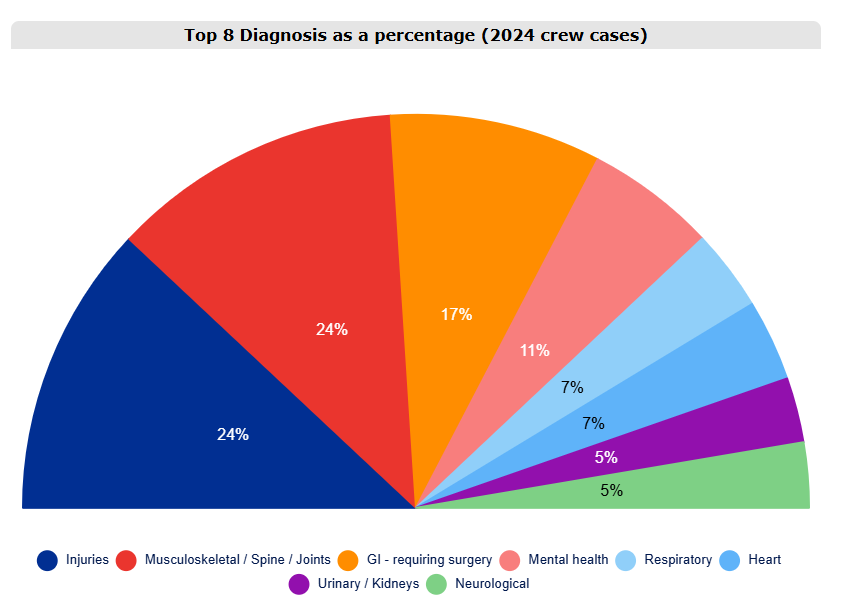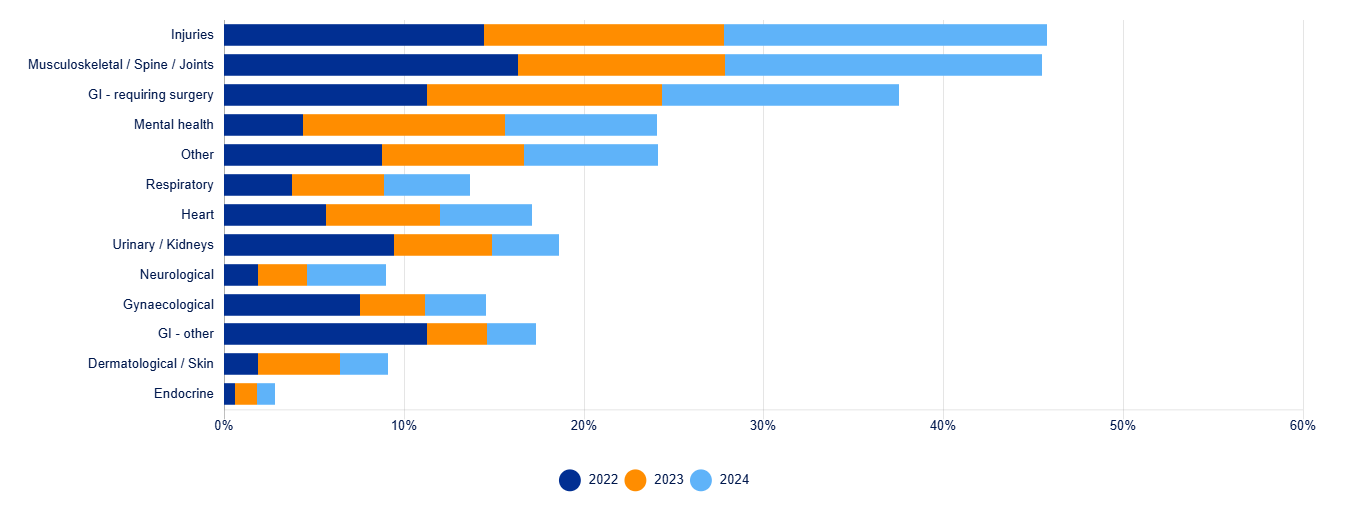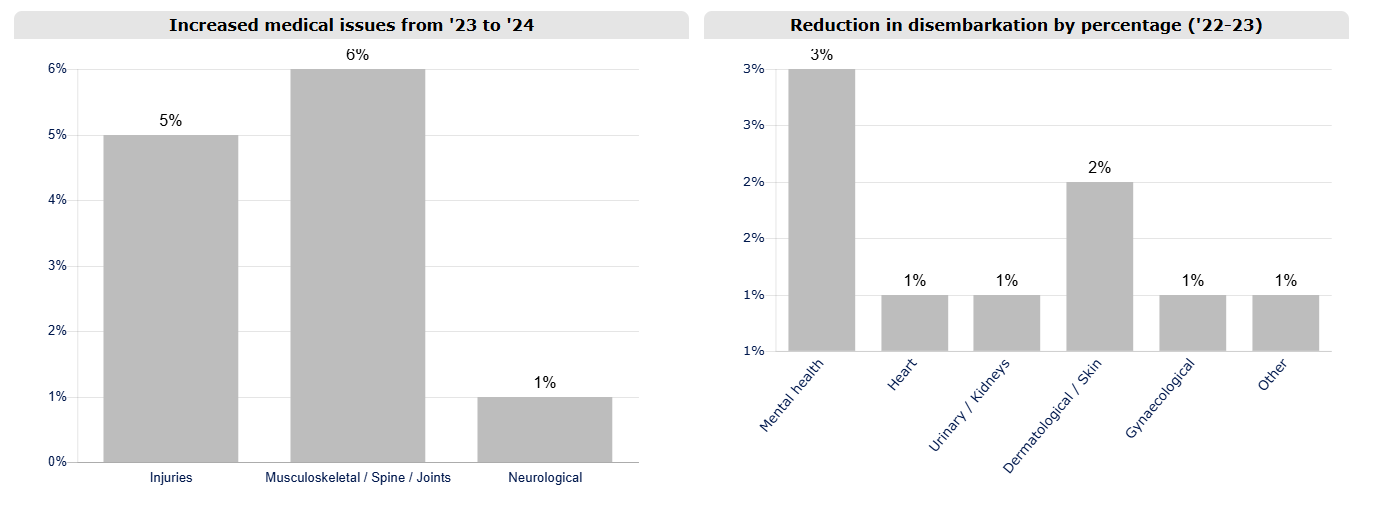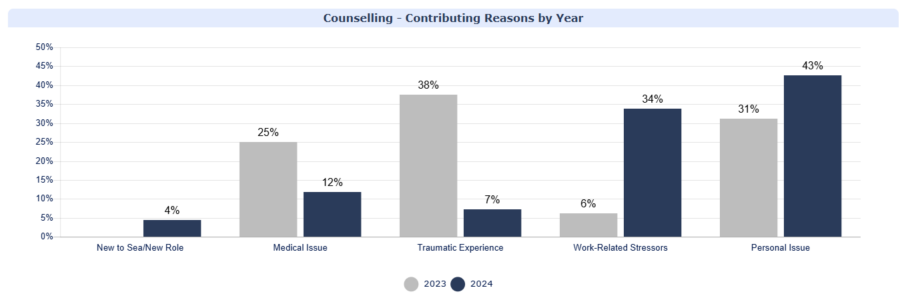
Exploring 2024 Maritime Medical Emergency Trends from VIKAND Insights
Delivering high-quality medical care at sea begins with understanding the unique healthcare challenges that crew members face. VIKAND’s Case Management division manages thousands of incidents annually, offering valuable insights into maritime medical emergencies.
By analyzing the latest 2024 data and comparing it to previous years, we can expand and improve maritime healthcare based on critical health and safety trends.
What caused the most health emergencies in 2024?
About half of 2024’s crew member medical emergencies fell into two categories: injuries (24%) and musculoskeletal, spine and joint issues (24%). These types of cases have always been at the forefront of crew members health issues, but this year they have increased.
Other top emergencies included gastrointestinal issues requiring surgery (17%), mental health conditions (11%), respiratory conditions (7%), heart-related issues (7%), urinary/kidney problems (5%) and neurological conditions (5%). Later in this article, we’ll explore some theories on year-over-year changes in key categories.
How 2024 compared to previous years
Examining emergency trends from 2022 to 2024 reveals a few important patterns:
Crew injury cases rose from 14% in 2022 to 18% in 2024. This could be interpreted in one of two ways: Either onboard safety is increasingly compromised, or more injuries are being reported rather than quietly worked through. However, the uptick in joint and musculoskeletal emergencies between 2022 (16%) and 2024 (18%) suggests that physical strain remains a challenge, and workplace safety is indeed an issue at sea.
Also of note: A gradual decline in heart-related cases may suggest that more crew members are receiving care for chronic cardiac conditions, allowing them to remain employed and productive. Urinary and kidney issues, as well as dermatological conditions, also declined, possibly due to better preventive care or evolving treatment strategies.
At first glance, the mental health numbers reflect a slight drop-off in emergencies following a sharp rise in 2023. This may indicate improved mental health support, but it could also reflect underreporting. We’ll explore this in more detail in the next section.
Overall, 2024’s emergency response data highlights both progress and ongoing challenges in maritime medical care. While improvements in mental health support are promising, the rise in injuries and physical strain-related conditions may underscore the need for stronger preventive measures and improved safety protocols.
Developing a clear picture of mental health at sea
The fluctuation in mental health cases presents a complex picture. While the decrease in 2024 might suggest improved coping strategies, it could also point to underreporting or barriers to seeking help. The spike in 2023 likely reflected an increased awareness and reduced stigma around mental health issues, leading to a surge in reporting.
To its credit, the maritime industry has increasingly recognized the importance of mental health among crew members. Psychological evaluations and counseling sessions surged in 2024, signaling a shift in awareness and the prioritization of mental well-being.
But what does this tell us about the state of mental health awareness, workplace conditions, and the effectiveness of our current screening processes?
Rising demand for psychological evaluations
Data from 2024 indicates a significant increase in psychological assessments conducted among crew members. This rise can be attributed to:
- Greater awareness and acceptance of seeking psychological support.
- Improved accessibility to mental health services.
- Early detection of more severe cases.
- A notable event onboard a cruise line (rogue wave) affecting guest-related cases, highlighting the need for psychological evaluations across different categories.
The upward trend suggests a broader cultural shift in the maritime industry, where seeking help is increasingly normalized. However, the data also suggests a predominantly reactive approach, as there has not been a corresponding increase in proactive mental health interventions.
Are we addressing the root causes?
While counseling sessions are widely used, they may place the responsibility on individuals rather than addressing systemic workplace stressors. Counseling can serve as a coping mechanism rather than a solution to underlying problems. A more holistic approach would balance individual support with organizational changes.
There is also the concern that counseling is sometimes used to "push" responsibility onto crew members rather than examining workplace structures contributing to mental health struggles. The increase in demand for support is a positive sign, indicating a willingness to seek help rather than ignoring issues. However, companies should also evaluate workplace conditions contributing to mental health challenges rather than solely focusing on treatment.
Compared with 2023, work-related stressors decreased in 2024, but personal issues significantly increased.
Many crew members set sail with unresolved personal struggles, including recent divorces, the loss of a close relative or a family health crisis. These factors often worsen once onboard, contributing to mental health diagnoses. However, a notable positive trend is that undeclared medical history has significantly decreased, indicating better transparency in pre-employment health assessments.
This shift from work-related stressors to personal stressors raises questions about the current state of pre-employment psychological screenings, and whether better personal preparation is needed before crew members embark on their contracts. Ensuring psychological resilience before deployment would reduce the impact of personal stressors on performance and well-being.
A rise in medical escorts & unfit-for-duty cases
In 2024, we also saw a stark rise in crew members being declared unfit for duty, and twice as many medical escorts for mental health emergencies compared to the previous year.
While onboard support has improved, allowing more crew members to remain fit for duty, increasingly severe mental health issues have resulted in more medical escorts. This could be due to delayed help-seeking or a genuine increase in mental health challenges. Addressing these issues proactively would reduce the need for repatriation and medical escorts, which come at a heavy cost to operators.
Pre-Employment psychological screening must improve
Last year’s health data suggest that many struggling crew members may have lacked the resilience or personality fit for maritime life from the beginning. This implies that more rigorous pre-employment psychological assessments would help prevent future crises. Screening should emphasize stress resilience, adaptability, and coping mechanisms.
Another key takeaway is that many crew members who experience adjustment disorders may not have been suitable for maritime work in the first place. Strengthening psychological screenings can prevent these cases, ensuring a more resilient workforce that can handle the unique challenges of life at sea.
Moving from awareness to action
While progress has been made in recognizing and addressing mental health issues, there is still work to be done. A dual approach is needed that includes strengthening workplace support systems and improving the psychological screening processes to ensure crew members are better prepared for the demands of maritime life.
Ultimately, this isn’t just about supporting individuals — it’s about fostering a sustainable, mentally healthy workforce. The growing need for preventive healthcare extends to physical emergencies as well. With injuries and musculoskeletal issues on the rise, enhanced safety protocols and physical wellness initiatives must be a priority.
This, combined with a continued focus on mental health support, stress management training and psychological resilience programs, will be key to addressing ongoing wellness concerns. Because as we know, crew members who are psychologically fit and physically cared for are much less prone to injury and illness, both of which cost operators millions of dollars a year.
In short, human health is holistic, and our approach to healthcare must be, too.











